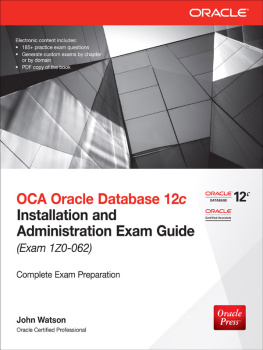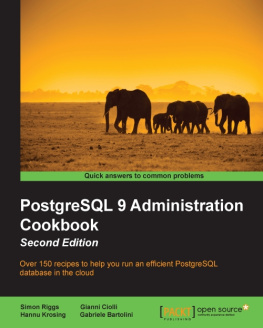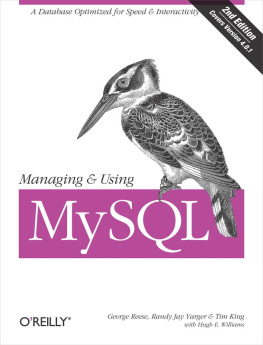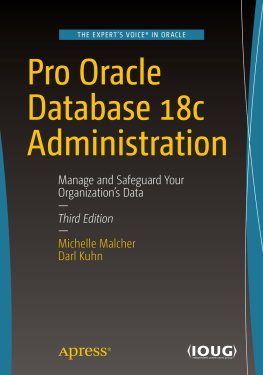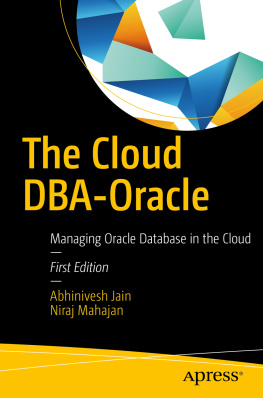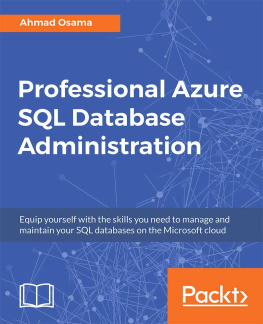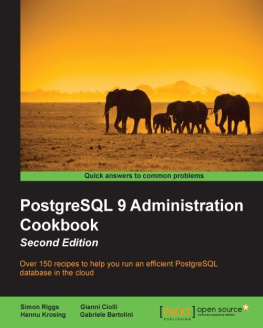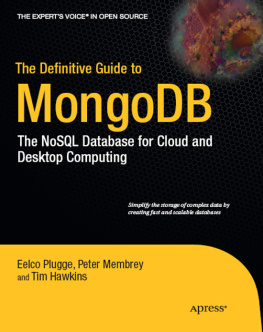nzenwa I. U - Database Administration In A Nutshel
Here you can read online nzenwa I. U - Database Administration In A Nutshel full text of the book (entire story) in english for free. Download pdf and epub, get meaning, cover and reviews about this ebook. year: 2016, genre: Home and family. Description of the work, (preface) as well as reviews are available. Best literature library LitArk.com created for fans of good reading and offers a wide selection of genres:
Romance novel
Science fiction
Adventure
Detective
Science
History
Home and family
Prose
Art
Politics
Computer
Non-fiction
Religion
Business
Children
Humor
Choose a favorite category and find really read worthwhile books. Enjoy immersion in the world of imagination, feel the emotions of the characters or learn something new for yourself, make an fascinating discovery.
- Book:Database Administration In A Nutshel
- Author:
- Genre:
- Year:2016
- Rating:3 / 5
- Favourites:Add to favourites
- Your mark:
- 60
- 1
- 2
- 3
- 4
- 5
Database Administration In A Nutshel: summary, description and annotation
We offer to read an annotation, description, summary or preface (depends on what the author of the book "Database Administration In A Nutshel" wrote himself). If you haven't found the necessary information about the book — write in the comments, we will try to find it.
nzenwa I. U: author's other books
Who wrote Database Administration In A Nutshel? Find out the surname, the name of the author of the book and a list of all author's works by series.
Database Administration In A Nutshel — read online for free the complete book (whole text) full work
Below is the text of the book, divided by pages. System saving the place of the last page read, allows you to conveniently read the book "Database Administration In A Nutshel" online for free, without having to search again every time where you left off. Put a bookmark, and you can go to the page where you finished reading at any time.
Font size:
Interval:
Bookmark:
DATABASE ADMINISTRATOR
Before we talk about the administration of a database, we should first understand what a data and database is.
DATA is simply the collection of facts from which conclusions may be drawn.
A DATABASE is a collection of information that is organized so that it can easily be accessed, managed, and updated. In one view, databases can be classified according to types of content: bibliographic, full-text, numeric, and images.
Database Software.
- MSSQL Server
- MySQL
- MongoDB
- PostGre Server
- OracleDB
- SQLLite etc
DATABASE ADMINISTRATION
Database administration refers to the whole set of activities performed by a database administrator to ensure that a database is always available when needed and he keep the documentation of the data.
DATABASE ADMINISTRATOR
A database administrator is an IT personnel who directs and performs all activities related to maintaining a successful database environment.
He is responsible for designing, implementing and maintaining the database system, establishing policies and procedures pertaining to the management security.
TYPES OF DATABASE ADMINISTRATOR
(1) APPLICATION DBA: The application DBA focuses on database design and the ongoing support administration of database for a specific applications.
(2) TASK-ORIENTED DBA: Task-oriented DBAs focuses on a specific DBA task. They can ensure that very knowledgeable specialists tackle very important DBA tasks.
(3) SYSTEM DBA: A system DBA focuses on technical rather than business issues, primarily in the system administration area. Typical tasks center on the physical installation and performance of the DBMS software and can include the following;
(i) Setting and tuning system parameters.
(ii) Ensuring appropriate storage for the DBMS.
(iii) Installing third-party DBA tools.
RESPONSIBILITIES OF A DATABASE ADMINISTRATOR
(1) Establishing the needs of users and monitoring user access and security.
(2) Monitoring performance and managing parameters to provide fast response to front-end users.
(3) Installing and testing new versions of database management system (DBMS).
(4) Writing database documentation, including data standards and procedures.
(5) Controlling access permissions and privileges.
DATABASE TOOLS FOR SYSTEM ADMINS
(1) Database comparer : This is a database comparison tool for analyzing the differences in Microsoft SQL server database structures from an easy-to-use UI. Amongst others, you can compare database objects such as tables, columns, indexes, foreign keys, users, roles and stored procedures.
(2) EMS SQL Managers Lite for SQL server : This allows you to create and edit SQL server database object and create, edit, execute and save SQL queries. It has a user-friendly interface and a lot of the functionality is wizard driven. It makes a good alternative to Microsoft SQL server management studio.
(3) Firebird : This is a powerful and lightweight open source SQL relational database management system for Windows and Linux. Features includes full support for stored procedures and triggers, full ACID compliant transactions, incremental backups and multiple access methods.
(4) Squirrel SQL : Squirrel SQL client is a JAVA-based database administration tool for JDBC compliant databases. It allows you to view the database structure and issue SQL commands. Support Databases such as Firebird, IBM, DB2, InterBase, Microsoft access, Microsoft SQL server, MySQL, Oracle etc.
(5) Recover Manager (RMAN) : This used to recover, restoring and backing up files in the database.
OVERVIEW OF DBA SECURITY
(a) To prevent breaches and improper data modifications, only authorized programmers and users should have access. It is the responsibility of the DBA to ensure that data is available only to the authorized users. Security must be administered for many actions required by database environment. Such processes includes:
(b) Accessing system catalog.
(c) Altering the structure of database objects.
(d) Running stored procedures.
(e) Creating and accessing user-defined functions and data types.
(f) Reading and modifying data in tables.
Necessary Skills Required of a Database Administrator (DBA)
List of skills required to become database administrators include all but not limited to:
- Good communication , teamwork, and negotiation skills
- Knowledge of database theory
- Knowledge of database design
- Knowledge about the RDBMS itself, e.g. Microsoft SQL Server or MySQL
- Knowledge of structured query language (SQL), e.g. SQL/PSM or Transact-SQL
- General understanding of distributed computing architectures , e.g. Clientserver model
- General understanding of operating system , e.g. Windows or Linux
- General understanding of storage technologies and networking
- General understanding of routine maintenance, recovery, and handling failover of a database (Database Administrator, 2016).
- problem-solving and good analytical skills
- familiarity with the main data manipulation languages and the principles of database design
- flexibility and adaptability
- good organizational skills;
- the skill to work to tight deadlines under pressure
- the ability to create and maintain strong working relationships with colleagues and customers
- business awareness and understanding of business requirements of IT
- a willingness to keep up to date with developments in new technology
- a commitment to continuing professional development (CPD)
- an understanding of information legislation, such as the Data Protection Act (AGCAS editors, 2015, Skills section).
What to expect as Database Administrator
- The working environment is informal and it's possible for work to be carried out from home or from other remote locations. There is an increasing trend towards home working.
- You'll find that the work can be demanding as organizations depend on effective databases, and there can be significant pressure to ensure that they operate smoothly, particularly if accessed online.
- Travel and absence from home overnight may occasionally be required.
- There are numerous opportunities to work abroad.
- Women are currently underrepresented in the IT profession. For information and jobs for women who want to work in technology take a look at Women in Technology .
Necessary Certifications for a Database Administrator (DBA)
There are many certifications available for becoming a certified database administrator. Many of these certifications are offered by database vendors themselves. By passing a series of tests and sometimes other requirements, you can earn a database administrator certification. Schools offering Database Administration degrees can also be found.
For example:
- IBM Certified Advanced Database Administrator - DB2 10.1 for Linux, Unix and Windows
- IBM Certified Database Administrator - DB2 10.1 for Linux, Unix, and Windows
- Oracle Database 11g Administrator Certified Professional
Qualifications
You can enter this career with a degree in any subject but the following may be particularly useful:
- computer science;
- computer software/computer systems engineering;
- electronics;
- information technology;
- mathematics;
- operational research.
Entry without a degree or HND is possible for those with good all-round IT skills.
Relevant HND subject areas include physical, mathematical and applied science. An HND in computer studies, software engineering or information technology in particular may increase your chances of entry.
A pre-entry postgraduate qualification is not essential but is likely to improve your prospects if your first degree is in a non-computing subject.
Next pageFont size:
Interval:
Bookmark:
Similar books «Database Administration In A Nutshel»
Look at similar books to Database Administration In A Nutshel. We have selected literature similar in name and meaning in the hope of providing readers with more options to find new, interesting, not yet read works.
Discussion, reviews of the book Database Administration In A Nutshel and just readers' own opinions. Leave your comments, write what you think about the work, its meaning or the main characters. Specify what exactly you liked and what you didn't like, and why you think so.

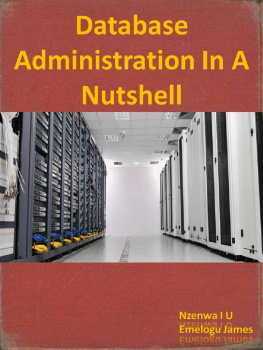
![Nzenwa I. U - Java Basics: An intro to Java and the Java developement [development] environment](/uploads/posts/book/109245/thumbs/nzenwa-i-u-java-basics-an-intro-to-java-and-the.jpg)


